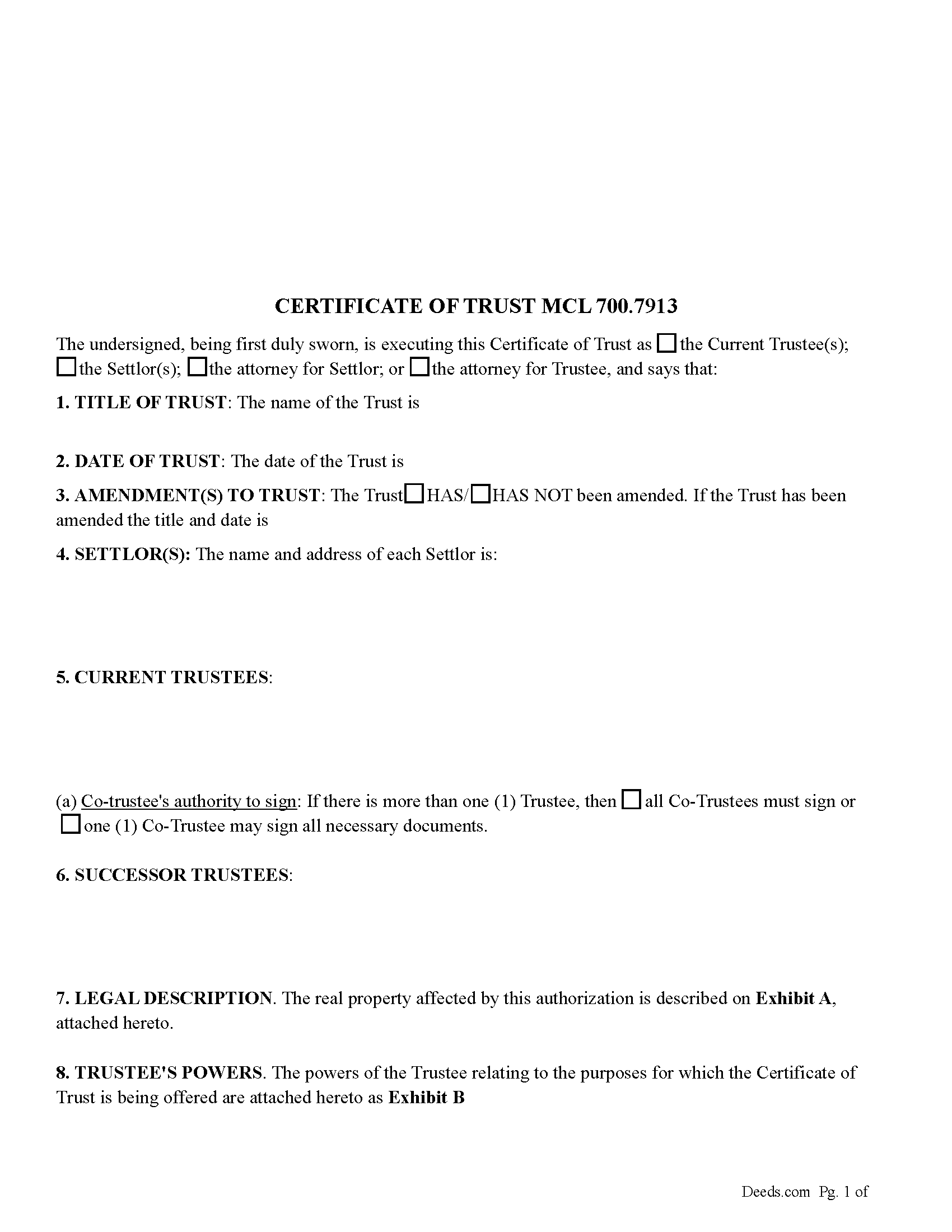Download Michigan Certificate of Trust MCL 700.7913 Legal Forms

Michigan Certificate of Trust MCL 700.7913 Overview

New legislation was signed into law in 2018 that, in essence, consolidated the two types of certificates of trust into one, a (Certificate of Trust) and a (Certificate of Trust Existence and Authority). This Certificate of Trust allows those with an interest in real property the necessary information regarding the Trust to help either fund the Trust or allow real property to be transferred with a clear title. A COT provides pertinent/relevant information needed to satisfy title companies and/or banks. When a Trustee wants to sell real property that is part of a trust, a COT will be required at or before the closing.
Pursuant to the current law, a certificate of trust must include:
The name of the trust, the date of the trust, and the date of each operative trust instrument.
The name and address of each current trustee.
The powers of the trustee relating to the purposes for which the certificate of trust is offered.
The revocability or irrevocability of the trust and the identity of any person holding the power to revoke the trust.
The authority of co-trustees to sign on behalf of the trust or otherwise authenticate on behalf of the trust and whether all or less than all co-trustees are required to exercise the trustee powers.
A statement that the trust has not been revoked, modified or amended in any manner that would cause the representations included in the certificate of trust to be incorrect.
The certificate of trust may be signed or otherwise authenticated by the settlor, any trustee (including a successor trustee), or an attorney for the settlor or the trustee.
700.7913 Certificate of trust.
Sec. 7913.
(1) Instead of furnishing a copy of the trust instrument to a person other than a trust beneficiary, the trustee may furnish to the person a certificate of trust that must include all of the following information:
(a) The name of the trust, the date of the trust, and the date of each operative trust instrument.
(b) The name and address of each current trustee.
(c) The powers of the trustee relating to the purposes for which the certificate of trust is being offered.
(d) The revocability or irrevocability of the trust and the identity of any person holding a power to revoke the trust.
(e) The authority of cotrustees to sign on behalf of the trust or otherwise authenticate on behalf of the trust and whether all or less than all of the cotrustees are required to exercise powers of the trustee.
(2) A certificate of trust may be signed or otherwise authenticated by the settlor, any trustee, or an attorney for the settlor or trustee. The certificate must be in the form of an affidavit.
(3) A certificate of trust must state that the trust has not been revoked, modified, or amended in any manner that would cause the representations included in the certificate of trust to be incorrect.
(4) A certificate of trust need not include the dispositive terms of the trust instrument.
(5) A recipient of a certificate of trust may require the trustee to furnish copies of those excerpts from each trust instrument that designate the trustee and confer on the trustee the power to act in the pending transaction.
(6) A person that acts in reliance on a certificate of trust without knowledge that the representations included in the certificate of trust are incorrect is not liable to any person for so acting and may assume without inquiry the existence of the trust and other facts included in the certificate of trust.
(7) A person that in good faith enters into a transaction in reliance on a certificate of trust may enforce the transaction against the trust property as if the representations included in the certificate of trust were correct.
(8) A person that makes a demand for the trust instrument in addition to a certificate of trust or excerpts of the trust instrument is liable for damages, costs, expenses, and legal fees if the court determines that the person that made the demand did not act pursuant to a legal requirement to demand the trust instrument.
(9) This section does not limit the right of a person to obtain a copy of the trust instrument in a judicial proceeding that concerns the trust.
(Michigan COT Package includes form, guidelines, and completed example) For use in Michigan only.